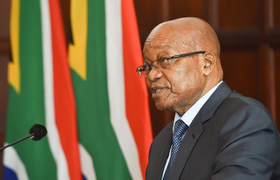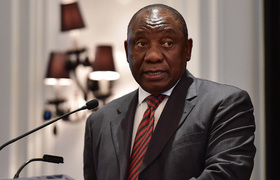‘National shame’ of corruption cannot be allowed to undermine democracy
01 October 2021 | Story Helen Swingler. Photo Getty Images. Read time 10 min.South Africa cannot allow accountancy and the role of accountants to become complicit in corruption or facilitate, enable or turn a blind eye to malfeasance in the management of public money, said South Africa’s Auditor-General Tsakani Maluleke. She was delivering the Vice-Chancellor’s Open Lecture on 30 September.
The lecture was titled “The role of accountancy professionals in strengthening democracy”. Maluleke is the first woman to hold the position of Auditor-General in the 109-year history of South Africa’s supreme audit institution (SAI) and was also its first Deputy Auditor-General.
Maluleke said it has never been more urgent to reaffirm the institution’s commitment to ethical conduct, integrity, quality and service. The country faces numerous threats to its fiscal integrity and looming local elections would bring shortcomings into sharp focus, she said.
“There is a democratic imperative to spring into action, as our individual participation is an obligation that we must take seriously. Our democratic success is highly dependent on our civic duty as citizens to actively participate and take our responsibilities seriously.”
However, democracy can only flourish and fulfil the aspirations of South Africans when backed and reinforced by accountability, she said. Citing former Brazilian president Fernando Cardoso, Maluleke said democracy is not about having a vote but about holding leaders to account.
Trust, integrity and service
As Auditor-General, she represents the Chapter 9 institution tasked with supporting the country’s democracy through auditing public funds and contributing to building a capable state with capable institutions effectively fulfilling their mandate in a transparent and accountable manner.
“These ideals, enshrined in our Constitution and expressed in our development blueprint, the National Development Plan, require our best collective efforts as a nation, while those of us in the profession provide the necessary insights and checks and balances to enable accountability.”
“The truth is that numbers, figures and data are not just abstract signifiers on a balance sheet. They have a human face.”
It is a reminder of the role accountants play in the country’s development and safeguarding democracy.
“The truth is that numbers, figures and data are not just abstract signifiers on a balance sheet. They have a human face.
“They signify the extent to which individuals have the opportunity to realise their full potential. They stand for the health and wealth of nations. Let us remember when we talk about accounting and democracy we are talking about people.
“That means we have a special duty to ensure that the integrity of the profession is preserved, protected and upheld in the rigour of practice. We must appreciate that our licence to serve society is founded on the trust that society places in us. Society expects us to serve its interests with utmost integrity and accountability. That is the basis on which we earn and maintain our licence to serve. We must continuously stand for trust, integrity and service.”
Failing the public
Sadly, she said, these principles had been severely undermined by some members of the profession, implicit in the scandals involving KPMG, one of the “big four” auditing firms, Nkonki, the black-owned auditing firm, and Steinhoff, the international retailing company.
Their accountancy professionals had failed to serve the public interest, leading to significant losses for shareholders, who include individual investors and ordinary people through their retirement funds and other institutional investment vehicles.
“It is the failure to improve people’s lives and the derailing of their democratic aspirations that bear the most eloquent testimony to the consequences of capture.”
“Taxpayers also lost a great deal of capital. The Public Investment Corporation [PIC], which invests on behalf of government employees, lost significant investment value as a result of the Steinhoff so-called ‘accounting irregularities’. The Government Employees Pension Fund is a defined benefit pension fund, and if its assets cannot cover its liabilities, taxpayers will have to foot the bill as those liabilities become due and payable to retired civil servants.”
The State Capture Commission, yet to conclude its report, had also provided “more than enough evidence” for concluding that the accountancy profession was implicated.
What has this great national scandal cost us?
According to the South African Institute of Chartered Accountants, who commissioned a study by Stellenbosch University, the figure is one-and-a-half trillion rand, lost to the country between 2014 and 2019.
“Clearly, state capture, with its ramifications, has a direct impact on the lives of all South Africans… How many hospitals could have been built for that money? How many schools, how many housing projects, how many enterprises, how many jobs?”
She added, “In the public service, where we audit, it is the failure to improve people’s lives and the derailing of their democratic aspirations that bear the most eloquent testimony to the consequences of capture.”
AGSA independence
But some good news came from the World Bank’s 2021 Global Synthesis Report into the independence of SAIs in 118 nations. Only two countries surveyed scored a perfect 10: the Seychelles and South Africa
“This is an affirmation of the independence of the Auditor-General of South Africa (AGSA) as a supreme audit institution, and we must celebrate it. However, it should also serve as a call to action: There is still much work to be done, and those of us who have dedicated ourselves to the task of supporting democracy by serving in this institution will find no easy road before us.”
What we can do is learn and reform, Maluleke said.
Citing Swedish government investment advisor Dag Detter, she said that without the use of modern accounting and professional governance, governments are at risk of allowing the largest wealth segment in the world – public assets – to be mismanaged, wasted, and open to corruption.
“It is time … for accountants to shed their dreary suits and glasses, the uniform of their Clark Kent alter-egos, and act like real superheroes.”
Addressing this shortcoming would be a first step to restoring trust in government and faith in democracy, to the benefit of society, said Maluleke.
“It is time, says Detter, for accountants to shed their dreary suits and glasses, the uniform of their Clark Kent alter egos, and act like real superheroes whose mission is to bring proper transparency to governments.”
Accountants and accountability
The White Paper issued by the South African Auditing Profession Trust Initiative, a project by the leaders of the local auditing profession to restore trust in and the integrity of the profession, contains several proposals to strengthen the auditing profession.
These include:
- ensuring the independence of the boards of professional services firms with independent non-executive members
- increasing the transparency of how firms operate and are governed
- implementing and enforcing clear, transparent policies that link partner and staff remuneration to audit quality
- clear scope of services restrictions for the audit practice, to prevent conflicts while allowing the skills of audit practitioners to be developed
- clear reporting obligations to external stakeholders and disclosures in the Transparency Report.
“Over and above issues of governance, the White Paper calls on us as professionals to be ethical, to live up to the key values and principles set out in our code of ethics, to remember that ours is to serve in the public interest, rather than to focus purely on the narrow interests of our clients.
“The White Paper serves as a timely and valuable reminder of the four simple words that must guide us in our work: trust, integrity, service, accountability. This is the mantra that must inform our thinking and practice.”
Reform, rebuild, revive
However, the profession also needs urgent reform, rebuilding and revival through capable leadership and institutions – and consequence management.
To this end, the national audit office has been empowered in law through the amended Public Audit Act of 2019. The amendment introduced a concept of material irregularity, born out of the failure to address audit findings that were tabled year on year by the Auditor-General, said Maluleke.
“It is now an instrument to influence and enforce change ... that should influence better governance and outcomes. It is not a system designed to be punitive but to encourage accountability and clean governance. These can only be achieved if the correct preventative controls or checks and balances are put in place to prevent losses, wastage, and any wrongdoing with public funds.”
The AGSA also continues to drive professionalism among its staff. A South African Institute of Chartered Accountants-accredited training scheme benefits over 1 200 young professionals annually.
“[Through] this we make a significant contribution to the growth and transformation of the profession, with benefits for both the public and private sectors.”
Staff undergo regular external assessments and the AGSA reports on its performance transparently in its annual report, including the corrective steps taken where set benchmarks were not met.
“We have to ensure that we conduct accountancy in the public interest as a key driver to our accounting and audit work. This means that the work we do must have regard for the interests of the users beyond our specific clients. The work we do must be of high quality and respond to the needs and expectations of our stakeholders.”
Maluleke concluded, “We live in a world where investment decisions are made and implemented quickly, by users of financial statements, who rely on the accountants and auditors to prepare and publish relevant and credible financial information. Our country’s prosperity depends on our ability to build and maintain confidence and trust in the accounting and auditing profession.”
 This work is licensed under a Creative Commons Attribution-NoDerivatives 4.0 International License.
This work is licensed under a Creative Commons Attribution-NoDerivatives 4.0 International License.
Please view the republishing articles page for more information.












